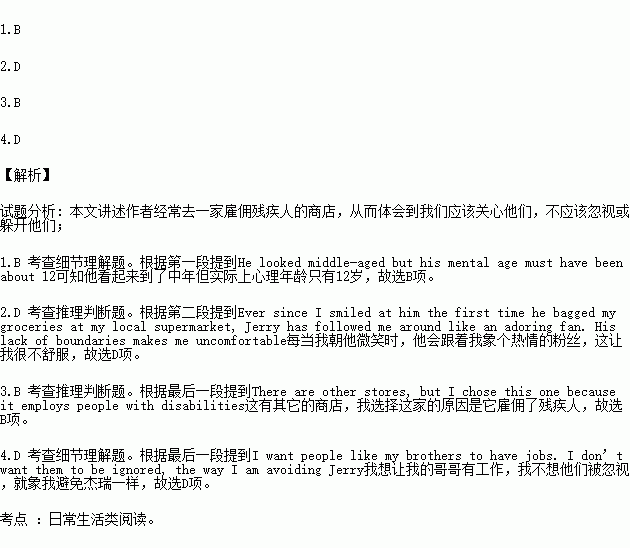题目内容
I spotted (发现;认出) him at the checkout counter, bagging at No.14. His arms shook violently as he placed a box of eggs into a plastic bag. He wore a name card upon which he had wiritten “Jerry” in kindergarten handwriting. He looked middle-aged but his mental age must have been about 12.
Ever since I smiled at him the first time he bagged my groceries at my local supermarket, Jerry has followed me around like an adoring fan. His lack of boundaries makes me uncomfortable. I don’t know how to avoid being noticed by him. I don’t want to speak to the manager — my complaint could get him fired. So I started avoiding him.
I can still remember the hurt I felt when I was 10 and our neighbor Mrs. Ward didn’t respond when I said hello with David and Diane. Instead, she hurried out of the supermarket, leaving me holding my brother and sister’s hands. I realized at that moment that I hated Mrs. Ward’s reaction. Why, then, years later, was I acting as she had?
I picked up a magazine Real Simple. The beautiful photos did nothing to straighten out the guilt in me. I was being ridiculous. The last three times I have seen Jerry, I rushed. There are other stores, but I chose this one because it employs people with disabilities. I want people like my brothers to have jobs. I don’t want them to be ignored, the way I am avoiding Jerry.
1.We know from the text that Jerry ________
A. suffered from fragile X syndrome
B. had a mental age not matching his real age
C. couldn’t write his name
D. only had a kindergarten education
2.Why did the author feel uncomfortable?
A. Jerry was like a fan of her
B. Real Simple couldn’t straighten out her guilt
C. Jerry always stepped on her feet
D. Jerry didn’t keep a proper distance from her
3.We can infer from the text that ________.
A. there are many people like Mrs. Ward
B. the store the author visited treated the disabled equally
C. most employees in the supermarket are disabled
D. the store manager ignored people with disabilities
4.What is the author’s attitude towards people with disabilities?
A. cautious B. unconcerned
C. ridiculous D. caring
 全优考典单元检测卷及归类总复习系列答案
全优考典单元检测卷及归类总复习系列答案
